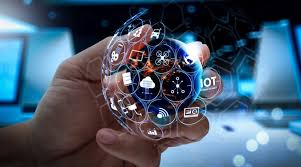In today’s digital age, technology has become an integral part of nearly every aspect of our lives. While many of us interact with technology through screens—smartphones, computers, tablets—its true potential extends far beyond just the devices we use. “Beyond the Screen: The Transformative Power of Technology” explores how technology is shaping our world in ways that go beyond digital interfaces, revolutionizing industries, improving lives, and solving global challenges.
1. The Evolution of Connectivity: Changing How We Interact
The internet has redefined the way we connect with others. Initially, the internet was primarily used for communication through email and text-based chats. Today, it has evolved into a platform for instant communication through video calls, social media, and collaborative platforms. With the power of connectivity, distance has been reduced to mere pixels on a screen, making the world feel smaller and more interconnected.
However, the true transformative power of connectivity lies in its ability to bridge divides. Virtual meetings and social platforms have created new spaces for people to connect, share knowledge, and collaborate across borders. As technology continues to improve, 5G networks and Internet of Things (IoT) will further enhance connectivity, enabling faster, more seamless communication, and empowering innovations like smart cities, autonomous vehicles, and remote healthcare.
2. Artificial Intelligence: Empowering Smarter Decisions
Artificial Intelligence (AI) is no longer a futuristic concept—it’s already transforming industries from healthcare and finance to retail and manufacturing. Through advanced algorithms and machine learning, AI systems can analyze massive amounts of data and provide insights that would otherwise be unattainable.
In healthcare, AI helps doctors make more accurate diagnoses, predict patient outcomes, and personalize treatment plans. In finance, AI-powered tools can analyze market trends, allowing investors to make smarter decisions. These innovations go beyond the screen and are transforming decision-making processes, improving efficiency, and reducing human error. As AI technology advances, it’s expected to create even more opportunities to improve lives and drive progress in countless fields.
3. Quantum Computing: Unlocking New Realms of Possibility
While the concept of quantum computing may seem like science fiction, it’s quickly becoming a reality. Unlike traditional computers that use binary data (1s and 0s), quantum computers harness the unique properties of quantum mechanics, enabling them to process information at speeds unimaginable with conventional computers.
This immense processing power will have wide-reaching implications in fields such as drug discovery, climate modeling, and cryptography. By harnessing quantum computing, scientists can solve complex problems faster, potentially uncovering cures for diseases, improving climate predictions, and enhancing digital security. Beyond the screen, quantum computing is set to revolutionize industries and reshape how we understand and address global challenges.
4. Biotechnology: Revolutionizing Health and Medicine
Biotechnology is another field where technology’s transformative power is increasingly felt beyond the screen. With advances in gene editing tools like CRISPR, scientists are now able to alter the genetic code of organisms with precision, opening up new possibilities for treating genetic disorders, improving agricultural practices, and even tackling environmental challenges.
In medicine, personalized treatments based on genetic information are becoming more widespread. Doctors can tailor treatments specifically to a patient’s genetic makeup, increasing the likelihood of success and minimizing side effects. Biotechnology is enabling new therapies, such as gene therapy and regenerative medicine, which hold the promise of curing previously untreatable conditions and even extending human lifespan.
5. Renewable Energy: Harnessing Technology for a Sustainable Future
Technology is playing a vital role in the push for a more sustainable future, particularly in the field of renewable energy. Solar, wind, and hydropower technologies are advancing rapidly, becoming more efficient and cost-effective. The development of new energy storage systems, such as lithium-ion batteries and alternative storage methods, is making it possible to harness renewable energy and distribute it more effectively.
Beyond just the energy grid, technology is also enabling more sustainable practices in agriculture, transportation, and urban planning. Electric vehicles (EVs) are gaining popularity as they reduce dependence on fossil fuels, while innovations in smart grids allow for more efficient energy use. As technology continues to progress, it will play a crucial role in creating a greener, more sustainable world.
6. Augmented and Virtual Reality: Creating Immersive Experiences
While AR (Augmented Reality) and VR (Virtual Reality) are most commonly associated with entertainment and gaming, these technologies are also making a significant impact in fields like education, healthcare, and real estate. AR overlays digital information onto the physical world, enhancing our interactions with it, while VR immerses users in entirely virtual environments.
In education, VR allows students to explore historical events or conduct science experiments in a simulated environment, offering an immersive learning experience that would be impossible in a traditional classroom. In healthcare, AR is helping doctors visualize complex medical procedures and improve patient outcomes. These technologies are not confined to screens—they are changing the way we learn, experience, and understand the world around us.
7. Autonomous Systems: Reimagining Mobility and Automation
Autonomous vehicles, including self-driving cars, drones, and robots, are reshaping industries in profound ways. These technologies leverage AI, machine learning, and sensors to perform tasks that once required human intervention, from driving to delivering packages.
In transportation, self-driving cars are set to reduce traffic accidents and increase efficiency, while drones are revolutionizing delivery services. In manufacturing and logistics, robots and autonomous systems are streamlining production processes, improving safety, and cutting operational costs. These innovations go beyond the screen, automating tasks and reshaping entire industries.
8. Space Exploration: Technology Expands Our Reach Beyond Earth
While space exploration has long been the domain of governments and large organizations, private companies like SpaceX and Blue Origin are pushing the boundaries of what’s possible. Advancements in space technology are allowing for more affordable and sustainable missions, with the potential to explore other planets and even establish colonies in space.
Space exploration also brings technological benefits back to Earth. Innovations developed for space, such as advanced materials, telecommunications, and satellite systems, are now widely used in industries ranging from telecommunications to agriculture. Technology developed in space is making its way back to Earth, improving life for people across the globe.
Conclusion: The Infinite Possibilities of Technology
“Beyond the Screen: The Transformative Power of Technology” underscores the far-reaching impact that technology has on shaping our world. It’s not just the devices we use but the innovations that power industries, drive sustainability, and improve human life. Whether it’s through AI, quantum computing, biotechnology, or space exploration, the possibilities for transformation are limitless. As we continue to push the boundaries of technology, the future holds the potential for remarkable advancements that can change the world in profound and positive ways.

